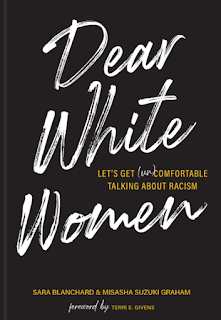Sara Blanchard and Misasha Suzuki Graham are the authors of the new book Dear White Women: Let's Get (Un)comfortable Talking About Racism. They are the co-hosts of the podcast Dear White Women. Sara Blanchard also has written the book Flex Mom, and is a consultant and certified life coach. She lives in Denver. Misasha Suzuki Graham is an attorney. She lives in the Bay Area of California.
Q: In your introduction, you write, "If you picked up this book, we're guessing that the developments of 2020 impacted you in some way and sent you searching for answers." At what point did you first think about writing this book?
Misasha: I think in some ways we’ve been writing this book since we started the Dear White Women podcast back in early 2019, as our own personal stories led us to want to change and expand the narrative in predominantly White spaces: the very same spaces that we’ve always been able to float through ourselves.
But 2020 pushed us in a very specific way, as we felt this was really a flashpoint in history - those where you’re forced to take a side and be a stand for what you believe in, and we felt this as early as the summer of 2020.
Sara: I think writing a book together was in the back of my mind ever since we started the show. But the way we produced the book - in a hybrid publishing model - requires up-front investment, and to be honest, given the timing of the pandemic when my family’s financial situation was changing, I wasn’t sure if it was the right time to do it.
What convinced me was asking my best friend why she thought we needed to write it, and she said that if there’s even a small chance that one police officer reads this book and therefore doesn’t end up kneeling on her son’s neck, she wants to do it. I was immediately all in.
Q: The book's subtitle is "Let's Get (Un)comfortable Talking About Racism." How did the two of you collaborate on the book, and did you have those uncomfortable conversations as you worked on it?
Misasha: I think we wrote the parts of the book that were the most personal for us, at least for the first two sections.
Being the biracial mom of Black, Japanese and White boys - but boys that the world sees as Black - means that I have been, and am still, doing the work with regard to what being Black in America means.
For the last section, which we can’t thank our developmental editor enough for pushing us to add, our experiences being Asian and White in the United States are similar enough so that only one of us needed to write those chapters, and we built on other discussions that we had on the podcast, or separately, to write the remaining chapters.
And yes, I would say we have no shortage of uncomfortable conversations in our lives generally, and the book was no exception, especially in the editing process where we had to figure out how to get some points out in a more practical, succinct and clear manner.
But that also helped us really define what the practical steps were for each chapter, as we very much wanted this book to be a practical guide to being anti-racist in your daily lives.
Sara: We entered into business together - which is funny to say, because we’ve been best friends for 25 years so I see her more as my sister than business partner - knowing that with any projects we took on, we wanted to be true to ourselves and our strengths, and make the work sustainable.
Having lived in different cities for the majority of our friendship, we leaned right into our epic talking skills with the podcast; we also both enjoy writing, so it felt great reframing content, researching deeper, and sharing what we learned with a different audience in a different format for this book.
As Misasha noted, we wrote the sections that felt most personal to us, but given that we regularly have uncomfortable conversations, it wasn’t surprising that some things came up during the course of the writing - mainly focused on making sure that we had the most practical, actionable content possible.
Q: What impact has writing the book had on both of you?
Misasha: It’s given me a deeper understanding of the history of our country when it comes to racism, and it’s given me even more incentive to have these discussions.
The statistics and the facts that we provide in our book are sobering, and my boys and husband are directly impacted by some of them. It solidified for me how understanding history, when combined with empathy, can lead to real change - but we have to do that internal work first.
So I’ve definitely decided to double-down on that concept and want everyone to read this book so that we can move past Anti-Racism 101 (where it seems like we are still largely stuck as a country) and onto ways to make actual change for marginalized communities.
Sara: I feel so much more grounded in information and confident about the need to have more of these conversations.
Having the listen/learn/act sections in each chapter really puts together an arc that I think is the cornerstone of change - not just to spur on all of the individual decisions we can make differently in our daily lives, but also as a foundation for any larger-scale changes we want to be part of.
I felt an internal tension between wanting to do more of that latter work, and still seeing the need to have level-setting baseline conversations within so many of our circles.
So for now, the book has led me to be comfortable owning my role as a biracial Japanese and White woman who can welcome more White people into this process of self-inquiry and education - so they CAN get behind the necessary structural changes to make this country more equitable and sustainable.
Q: What do you see looking ahead when it comes to racism in the United States--and talking about racism?
Misasha: We finished the book in early 2021, right after the Capitol insurrection, and it’s been disheartening to see that many of the chapters in our book have been lived out in very real ways even in 2021. I like to remind people of this when they think that we had this huge racial reckoning in 2020 and now we’re onto other topics. We’re clearly not.
But what gives me hope is that I’ve had more conversations about racism in 2020 and 2021 than I’ve probably had in my entire life combined - and so that means that at the very least we are starting to talk about this, and not just behind closed doors when no White people are around.
I’m hopeful that talk will lead to understanding, and that empathetic response will move us further towards a better future for all of us.
Sara: Is it okay to have a healthy dose of skepticism? I’ve been dismayed at the increasingly stark division of what I’ve come to see as “we-culture” vs “me-culture” in the United States, and I think that mindset plays a critical role in a person’s decision to engage in, or avoid, conversations about racism - or any difference, really.
That said, I’m perhaps naively continuing to believe in the possibility of positive change, because (a) I’m a life coach and am trained to support human adaptability, and (b) when push comes to shove, I know a society cannot continue to exist when the cracks between people become deep enough - so I’m willing to keep putting in the work.
Q: What are you working on now?
Misasha: It’s so exciting to think about what we have coming up - not only do we have a busy fall with our book launch, but we’re now doing more work with corporate groups in terms of bringing difficult conversations about racism into their spaces, and how we support everyone at work.
We still release new episodes of our podcast every Wednesday, and I’m personally excited about the racial literacy discussions and webinars that I’ve been fortunate enough to do with schools and parents in the Bay Area, along with the pro bono legal impact work that I’ve been able to do primarily around voter suppression and election protection issues.
Sara: In addition to the corporate and educational settings we’re working in together as a team, and of course producing our weekly podcast, I am personally enjoying the new space I’ve leaned into as an equity coach.
It’s clear to me that a lot of the work uprooting systemic racism is very much related to our willingness and ability to participate in introspection and commit to changing our patterns of behavior; it’s so rewarding.
I’ll be renewing a partnership with a local community college in the fall, and doing more webinars and projects within women’s groups here in Denver.
Q: Anything else we should know?
A: Definitely follow us on social media to find out more real-time - we’re
continually working on bigger and more impactful initiatives and put out a lot
of education and updates there!
We’re at @dearwhitewomenpodcast on Instagram and @DWWPodcast on Twitter, which are our two main platforms. Also, if you want to get more updates about what we’ve been up to, and some of our musings over the past month, get on our email list - you can sign up at www.dearwhitewomen.com.
--Interview with Deborah Kalb


No comments:
Post a Comment